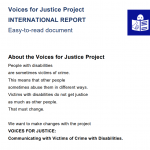This report uses the landmark United Nations International Principles and Guidelines on Access to Justice for Persons with Disabilities as the basis for a normative assessment of the strengths and gaps in the access to justice provisions of the European Union’s Victims’ Rights Directive. Drawing on evidence from seven national research reports, we show how gaps in the Directive are manifested in national legal frameworks, policies and practices. The UN Access to Justice Principles set clear obligations and explain, in detail, the practical steps that can secure access to justice for people with disabilities. And while key provisions of the European Union Victims’ Rights Directive help ensure that reporting, investigation and criminal proceedings are victim-focused, and recognise victims’ rights to information and communication, the overall framework of the Directive must be strengthened in specific ways to meet international obligations on access to justice, and specifically obligations under the United Nations Convention on the Rights of Persons with Disabilities.
Victims with disabilities face significant barriers in the flawed criminal justice systems in Europe. In its aspirations to create a more victim-centric approach to criminal justice, important conversations are on-going within the EU, aiming to bring forth a criminal justice system based on the principles of human rights and human dignity, shaped by existing EU obligations regarding victims’ rights to an effective remedy and investigation. People with disabilities must be involved in those debates and innovations.
Download the Voices for Justice international report – Humanising Justice from the Voices for Justice: Communicating with Victims of Crime with Disability project here in English.
 |
|---|
The Executive Summary is available here in English and in English Easy-to-Read.
 |
 |
|---|
The Executive Summary has been also translated to all project languages: Bulgarian, Croatian, Czech, Lithuanian, Romanian, Slovakian and Slovenian.
 |
 |
 |
|---|
 |
 |
 |
|---|
 |
|---|
We collected the recordings and presentations from the last day of the Humanising Justice conference, focused on the Voices for Justice: Communicating with victims of crime with disability project below. The Voices for Justice international report was launched at this conference.
Welcome session, with video messages from Helena Dalli, European Commissioner for Equality and Gábor Gombos, former member of the United Nations Committee on the Rights of Persons with Disabilities and Senior Adviser to Voices for Justice project. Our colleague and friend, Gábor passed away shortly before the conference, read our tribute to him here.
Session 1: Experiences of victims with disabilities in the criminal justice system with Mindaugas Dvylaitis from Lithuania and Sofia Stoyanova Georgieva from Bulgaria. Mindaugas and Sofia have been interviewed for the national reports for the Voices for Justice project, and they agreed to share their stories with a wider audience in Brussels.
Session 2: The international legal framework: Access to Justice for persons with disabilities in Europe. Our Legal Consultant to Voices for Justice project, Joanna Perry introduced the international report in this session, followed by replies from Aleksandra Ivankovic from Victim Support Europe, Professor Markus Schefer, Member of the United Nations Committee on the Rights of Persons with Disabilities and Carlos Rios Espinosa from Human Rights Watch. You can access Joanna Perry’s presentation here.
Session 3: Presentations on barriers to justice by Marta Hirsch Ziembinska from the European Ombudsman office, Lucy Series from the University of Cardiff, Amalia Gamio Ríos, Member of the United Nations Committee on the Rights of Persons with Disabilities and Charles O’Mahony from the National University of Galway. The presentations by Lucy Series, Amalia Gamio Ríos and Charles O’Mahony are available here, here and here.